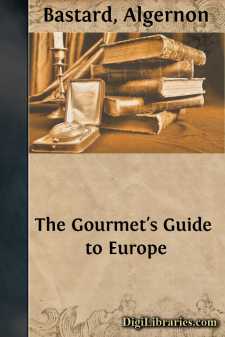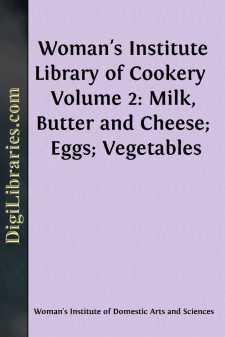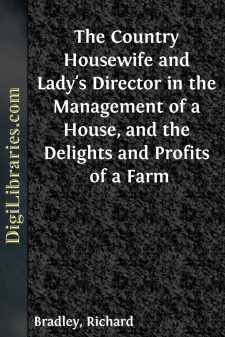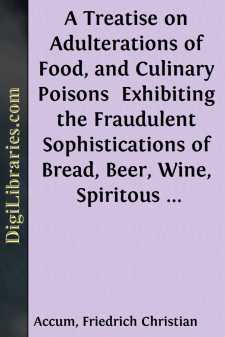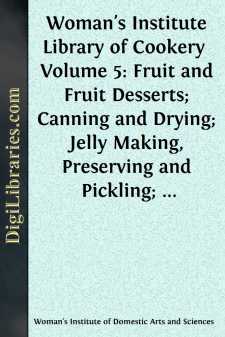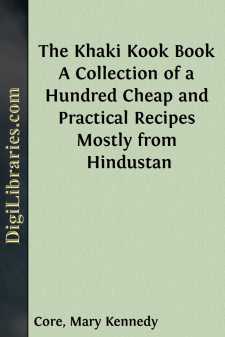Cooking
- General 70
- History 1
- Reference 10
- Regional & Ethnic 3
- Vegetarian 10
Cooking Books
Sort by:
by:
Eliza Leslie
SOUPS. GENERAL REMARKS. Always use soft water for making soup, and be careful to proportion the quantity of water to that of the meat. Somewhat less than a quart of water to a pound of meat, is a good rule for common soups. Rich soups, intended for company, may have a still smaller allowance of water. Soup should always be made entirely of fresh meat that has not been previously cooked. An exception to...
more...
by:
Algernon Bastard
PREFACE Often enough, staying in a hotel in a foreign town, I have wished to sally forth and to dine or breakfast at the typical restaurant of the place, should there be one. Almost invariably I have found great difficulty in obtaining any information regarding any such restaurant. The proprietor of the caravanserai at which one is staying may admit vaguely that there are eating-houses in the town, but...
more...
by:
Catherine Owen
INTRODUCTION. By choice cookery is meant exactly what the words imply. There will be no attempt to teach family or inexpensive cooking, those branches of domestic economy having been so excellently treated by capable hands already. It may be said en passant, however, that even choice cooking is not necessarily expensive. Many dishes cost little for the materials, but owe their daintiness and...
more...
MILK IN THE DIET 1. As is well understood, milk is the liquid that is secreted by the mammary glands of female mammals for the nourishment of their young. The word milk as it is commonly used, however, refers to cow's milk, because such milk is employed to a greater extent as human food than the milk from any other animal. Cow's milk in its perfectly fresh raw state is a yellowish-white,...
more...
by:
Richard Bradley
The Reason which induces me to address the following Piece to the Fair Sex, is, because the principal Matters contained in it are within the Liberty of their Province. The Art of Oeconomy is divided, as Xenophon tells us, between the Men and the Women; the Men have the most dangerous and laborious Share of it in the Fields, and without doors, and the Women have the Care and Management of every Business...
more...
Foreword No apologies are offered for this book. In fact, we rather like it. Many years have been spent in gathering this information, and naught is written in malice, nor through favoritism, our expressions of opinion being unbiased by favor or compensation. We have made our own investigation and given our own ideas. That our opinion does not coincide with that of others does not concern us in the...
more...
by:
Kenelm Digby
INTRODUCTION With the waning of Sir Kenelm Digby's philosophic reputation his name has not become obscure. It stands, vaguely perhaps, but permanently, for something versatile and brilliant and romantic. He remains a perpetual type of the hero of romance, the double hero, in the field of action and the realm of the spirit. Had he lived in an earlier age he would now be a mythological personage;...
more...
PRELIMINARY OBSERVATIONS. Of all the frauds practised by mercenary dealers, there is none more reprehensible, and at the same time more prevalent, than the sophistication of the various articles of food. This unprincipled and nefarious practice, increasing in degree as it has been found difficult of detection, is now applied to almost every commodity which can be classed among either the necessaries or...
more...
FRUIT IN THE DIET 1. FRUIT, as is generally understood, is the fleshy, juicy product of some plant or tree which, when ripe, is suitable for use as food. Although some fruits are seedless, they generally contain the seeds of the plants or trees that produce them. Many fruits require cooking to make them palatable, others are never cooked, and still others may be cooked or eaten raw, as desired. Fruits,...
more...
About ten years ago the idea of writing a little cook book had its birth. We were in Almora that summer. Almora is a station far up in the Himalayas, a clean little bazaar nestles at the foot of enclosing mountains. Dotting the deodar-covered slopes of these mountains are the picturesque bungalows of the European residents, while towering above and over all are the glistening peaks of the eternal...
more...



